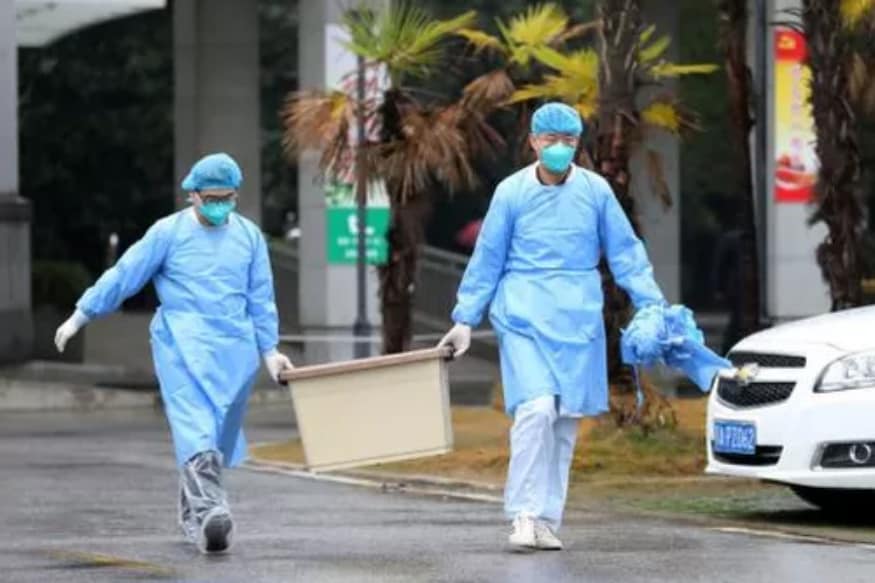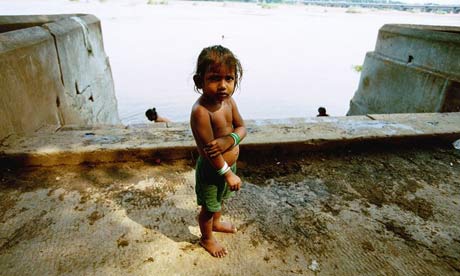“Go corona! Corona go!” Ramdas Athawale, a minister in the state government of India, chanted this phrase again and again at a prayer meeting at the Gateway of India. Among those invited to participate were Buddhist monks and the Chinese Consul General in Mumbai. The rap-like cadence soon inspired memes and a pop version.
While places of worship have been shut down to facilitate social distancing, nobody had the courage to stop a ‘gaumutra’ (cow piss) party on March 14. Guests drank the urine from mud bowls. They recited prayers before a holy fire beseeching the virus to leave. Swami Chakrapani, the president of the Akhil Bharat Hindu Mahasabha that organised the event, said, “Coronavirus has come because of the people who kill and eat animals. When you kill an animal, it creates a sort of energy that causes destruction in that place. They (global leaders) should get cow urine imported from India because the almighty resides only in the Indian cow and not in any foreign breed. I request all the presidents and prime ministers of the world to take cow urine on a daily basis. You have all these scientists who don’t know the cure, we have the cure given to us by the gods.” He also claimed that this was the “only cure” for COVID-19.
All this took place in the country’s capital even as government officials and ministers were issuing statements about scientific measures used to deal with the virus. This was a well-publicised event, yet there were no calls for a ban on it.
There is a call for a ban on the Tablighi Jamaat centre in New Delhi. The immediate reason is that between March 11-13 it hosted around 2000 people, some from overseas, before the lockdown. 24 of the participants have tested positive, and some are untraceable. This has come as an opportunity for the rightwing; the ruling party’s minority affairs minister called it a “Talibani crime”. However, some questions have been raised regarding the permission granted for the event as well as police laxity; the Jamaat premises share a wall with the police station. For a few days now some media channels are seeking a ban on the organisation under the garb of restraining ‘spreaders’.
Such communalisation apart, this event was unnecessary and could be one of the major instances of community spread. Gatherings, be it sects, churches or such jamaats, where devotees have ignored reason to be one with god in the company of others, have resulted in several such spreads.
***
Since temples, mosques and churches are shut, devotees look for other outlets, other gods. In the South Indian state of Kerala, the prayer being shared on social media is, “Saint Corona, protect us from coronavirus.” St. Corona has never been popular in the state nor was she the patron saint of epidemics. Her name has promoted her as the annihilator of the virus.
Applauding medical workers too has been imbued with a fantastical explanation: That March 22, the day Indians rang bells and clapped, was Amavasya, the darkest day of the month when evil forces like viruses have maximum power. Clapping and clanging vibrations reduce virus potency, it was said, and the increased blood circulation boosts immunity.
What is it about superstition that holds people in thrall, sometimes even more than religion does? Unlike belief systems, they do not have a halo. Superstitions give people the power to deal with an immediate threat to themselves. Some may even perceive their belief as a rational exercise that they are ‘scientifically’ experimenting upon.
Mass superstitions such as the cow urine drinking one are dangerous simply because, like placebos, they cannot be proven wrong. There have been instances of people refusing medical intervention based on the belief that faith, or faith-approved palliatives, alone can cure.
Adding to the mythology of magic cures, the government announced that the serials Ramayana and Mahabharata, based on the revered Hindu epics, would be telecast again on the national channel after over three decades. It is assumed that this will help people forced by the lockdown to retain their moral fibre through its kitschy portrayal.
India is, quite literally, in ‘Ram bharose’ mode, where riding on faith is considered as a confirmation of its efficacy. That the virus hasn’t yet affected the country as much as it has the rest of the world – 1932 confirmed cases, 55 deaths – is seen as some sort of karmic victory.
The facts are quite different, though. According to the director of the US Center for Disease Dynamics, Economics, and Policy, Ramanan Laxminarayan, by July end 300 to 500 million Indians would be infected of which a tenth would be severe cases. “Our model predicted that at the outbreak’s peak, even with conservative assumptions, there would be 10 million patients with severe Covid-19 disease in India, many of whom would need to be hospitalized. India has fewer than 100,000 intensive-care unit beds and 20,000 ventilators, most of which are only in the large cities.”
***
Large cities depend on migrant labour. Most are daily wagers, of which about 744 million earn Rs. 44 (58 pennies) a day. They have little or no money left. Some are walking several miles to reach their villages. They believe hunger will kill them before the virus even gets to them. As one of them said, “I know everything about coronavirus. It's very dangerous, the whole world is struggling. Most people who can afford and have a place to stay are indoors. But for people like us, the choice is between safety and hunger. What should we pick?”
There have been instances of people dying on the way. The finance minister announced a package worth $22.5 billion as well as rations for three months to reach the poor. Many have not heard about these schemes nor received anything. Returning to their villages isn’t a panacea. As a man on his long trek of 542 kms to home said, “We came to Delhi in the first place because our farms were destroyed due to stray cattle who use to eat our crops. So, if we go back to our village, there also we have to work as labourers, but there is no work anywhere.”
When Prime Minister Narendra Modi urged people to applaud the doctors, nurses, paramedics who served selflessly despite risk to themselves, those from the informal sector that constitutes 90 percent of the labour force in India were not on anybody’s mind. There is nothing grand about sweeping floors, dusting furniture, doing the dishes, or hawking and collecting garbage; they do not save lives, or minister to the ill.
However, the elite shared their ‘awws’ over a picture of a rag-picker noiselessly clapping, his expression confused. For them, it was evidence that the PM’s message had reached this poor man who cared for the carers. Ironically, social distancing that is embedded in the Indian casteist culture considers people like him to be a virus. Nobody cares that he belongs to the amorphous population of 1.8 million homeless people who do not even figure in the poverty or infected statistics because they do not even exist on any document.
--
Published in CounterPunch
--
Published in CounterPunch



















